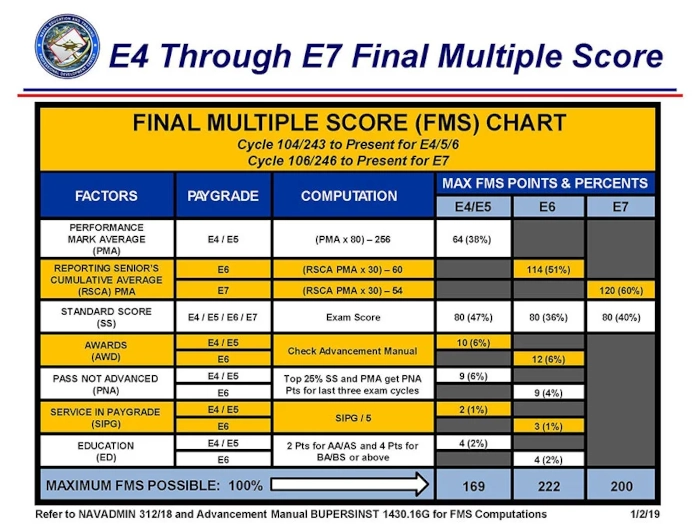
Advancement Results & Chief Selection Board | Profile Sheet
Advancement

Advancement
Related to this topic
Download the Final Multiple Score Calculator to your mobile device.
* Please note that some links require that you be on a .mil domain computer to access that website.
On this page you will find information on the E-4 through E-7 advancement exam and Chief's selection board results. Sometimes the Navy will move around the publication of the results to ease the burden associated with bandwidth on their servers so final results may not appear immediately in their final place.
For those who do not make it, it is a good time to take stock on how you prepared for the exam or selection board. Below I discuss a few points you may want to consider if you are trying to advance.
Don't forget to use your profile sheet (linked below) to see how you compare with others in your rate. Make sure you look at your weak areas shown on the profile sheet. If the material is on the next bibs, you will know what area to concentrate on first! And that reminds me - study your weak areas first because it takes longer. As you approach exam time and study your stronger areas, you will see that you have covered more ground since it takes less time to study your strong subjects.
You must be on a .mil domain computer to access your profile sheet. You should contact your ESO if you cannot access your profile sheet.
Your profile sheet provides valuable information on your Final Multiple Score (FMS) elements, the minimum FMS cut score, and an exam content topic area breakdown that provides the number of questions answered correctly and how well you did compared to peers.
(E-4 Through E-6)
One mistake sailors make is to wait for the Navy Advancement exam results to come out before they start studying again. Whether you are reserve or active duty it is a big mistake to stop your studies! Besides your profile sheet, the advancement quotas as well as the CREO group can give you a good indication of where you stand compared to your peers, and how much you need to study in order to advance in rate. The quotas (public version) are usually released after the Navy Advancement exam results come out but will show a good trend on how many sailors are being advanced in a particular rate.
Simply put, it goes like this. If the advancement quotas for your rate have a 30% advancement rate and your profile sheet has you on the lower percentile of the advancement test, your chances of advancing are less than someone with the same quota who missed the advancement exam by 1 point! In the rough & tumble world of the Navy wide Advancement exam, you are in direct competition with those in your own rate and rank!
That doesn't mean you shouldn't help each other, on the contrary you should! The material for the Navy advancement exam is so large that study groups or partners will only compliment your individual studies. And in the end its all going to depend on how hard you study on your own, compared to others in the first place in addition to how your Navy evals look. If you remember that you are your own teacher, responsible for setting your own study time, you'll get a picture of what it really takes to advance in rate.
*****
Based on past releases, this is a fictitious time line of the Chief's board that starts when the board has adjourned and the results given to the Chief of Naval Personnel. Also, please remember that not all releases are they same. Sometimes there are delays and sometimes there is chaos.
7-17-202x
Board Adjourns
7-xx-202x
CNP Callout
(very important, hint, hint.)
7-xx-202x
TRIAD Notification
(release date sometimes published, sometimes not.)
8-05-202x, 11:00AM
Release to TRIAD
(CO, XO, CMC)
8-06-202x, 11:00AM
Public Release
24hrs later via NAVADMIN & Bol.
*****
Quotas determine your advancement opportunity each cycle, but it is the Final Multiple Score (FMS) that determines which Sailors will be advanced in each rating. The FMS is made up seven factors, with performance and rating knowledge as the two most heavily weighted factors. The Navy Advancement Center pulls data from several sources to calculate each Sailor's FMS. The FMS Calculator provides historic cut scores for each rating, and you can use the application to calculate your own FMS.

E4 - E6 enlisted frocking ceremonies allow Sailors to wear the uniform of the next-higher paygrade before being advanced. No less than 3% are advanced in the first five pay increments, with the majority of Sailors being advanced in the final pay increment. Advancement dates are determined by fair share incrementation across a paygrade, with the highest Final Multiple Score in each rating being advanced first. You can sign up for email notifications at the top of your profile sheet page, and will be notified when a new profile sheet with the advancement date is determined.
Tonyo
Site Map
Privacy Statement
Advancement Career Guide & NPC News
for Enlisted Sailors, Veterans, Spouses & Family
Contact Me
NavyAdvancement.com
Copyright © 1998 - 2025